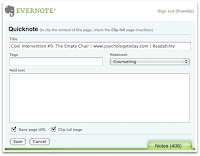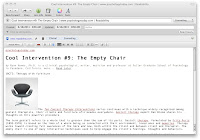3/2/12
Using Evernote Clearly to Capture Articles Into Evernote to Read Later
I have started to use Google Chrome. I found the Clearly extension. From my MacBook Air using Chrome, when find an article I want to read later, I simply click on the Evernote Clearly icon. This will format the page and bring it up in a new window, which will allow you to clip the page, not just theURL, to Evernote.
10/15/11
Upgraded iPod Touch to iOS 5
Downloading iTunes 10.5 and iOS 5 were quick and painless. The installation was not so quick and was, while painless, a bit disconcerting.
The slow part was mostly due to Apple’s thoroughness, so one shouldn’t complain. Backup, reset to factory settings, before dating the hand-held, all take time, and before you do this, you want to do your own backup of media.
When it finally got to the iPod update, iTunes claimed that the iPod Touch was over capacity… by 22 G. iTunes did not stop, and having heard of this from others in the Internet, I ignored the warning.
Eventually it settled down, and the capacity settled down to something reasonable. iTunes noted that there were a bunch of updated apps, I assumed to work with the new version of iOS. iTunes went through the usual steps in the “sync” process, but seemed to hang on the last step. It claimed it was synching the album artwork, and waiting for the items to copy. One hour… two… Some have waited all night. Not me.
I ejected the iPod Touch from iTunes, have no problems, even though it still gets hung at the last step.
I like the new system with its changes.
6/18/11
Using Readabiliy and Evernote to capture items from the web
- Find an article I want to save, e.g.,
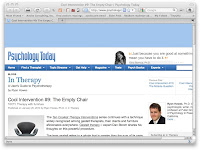 .
.
- Click on your keyboard’s “right single quote” button (’) for the Readability
bookmarklet. The page you are on will be converted to a more readable
form.
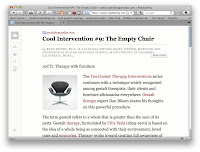
- Send the “readable” page to Evernote by clicking on the Evernote icon
on your browser.
That action will bring up an Evernote quicknote
You can see I selected “Clip full page” and “Save page URL.” This window also allows one to add tags and select the notebook. (If you are not logged into Evernote, you will have an opportunity
to do that.)
Over on Evernote on the computer, we see the saved page.
On the handheld in Evernote, the articles are indeed readable. 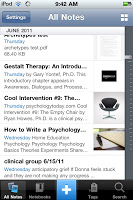
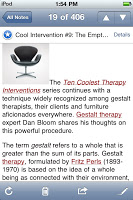
Reading this, it might seem like there are a lot of steps. There are
only 3 when you find a page you want to save: click on readability; click on Evernote; and click to save to Evernote.
6/17/11
CrashPlan saves me yet again.
I looked in Time Machine. It was not there. Maybe TM cleaned things up. Maybe I have something set to delete files so the backup drive doesn’t fill up too fast. I tried Crashplan. I put in the search string “.MP4.” It found some, but not the one I needed. Bummer!! Oh. Wait. “Display deleted files.” Check. Try again. BINGO! Brilliant.
I have CrashPlan Family Unlimited. Like getting a “replacement” policy for fire insurance, when you need it you’ll be glad you did.
5/12/10
“What are you looking for in a job?”
“Never again spend all day talking about nothing that will never get made (sic). I want to do real things; to think about real stuff, for real people, who need real things done, and I want to feel great about my environment where I do it. If I am going to spend 10 hours a day there, I need to like [the people there] a lot… to have a culture that works. Money is the reason people say they leave a job, but culture is the reason that money becomes an issue.”I was listening to the “43 Folders” podcast of Merlin Mann’s Time & Attention Talk at Rutgers. He was discussing the culture of meetings in different companies. As I listened I thought about a question someone had recently asked: what sorts of things are you looking for in a job?
When talking about job satisfaction and dissatisfaction, more than once I’ve had someone say, “That’s why they call it ‘work’ and not ‘vacation.'” While that sounds very clever, it does not address the other aspects of, and desires in, a job. I don’t know about you, but I am at the point in my life where benefits and salary are important, but they are second to having meaningful work to do and enjoying it, which includes the people, the environment, the culture, and the customer. Put another way, making a ton of money with fabulous benefits, producing wonderful and accurate reports that will sit on a shelf, sounds like Purgatory, if not Hell. (Granted, it beats doing all that for lousy pay.) Interesting and useful work trumps salary every time.
(Caveats: We need to eat. We need to be able to care for our health and that of our families. Sometimes, for a season, the most important thing is income. The economy could be so bad, and our particular skill set so out of step with what is needed, that we will do whatever we can to survive. I may be naïve, but I do hope that those times are rare.)
So, what does my perfect job look like, after things like working for and with an organization I can “get behind,” whose mission or purpose I can support and help advance? First, what Merlin described is a good start. Real challenges, real work, working with great people, for customers with real needs, who know they have them. I’ve been blessed with working with great people at every place I have worked, really, but that alone doesn’t offset “know-it-all” customers. Next, helping develop and guide others. This does not necessarily mean being a supervisor, though I have been very successful and satisfied doing that. Finally, the ability to work at home sometimes, is a great benefit.
I remember very well a recent job I had. I was a project manager leading an effort to assess the risks associated with an unbelievably large—really, unmeasurable—network. Further, we, the team, had an inkling that when we were done and the mathematics and statistical analyses were all proven, the final report would be put on a shelf. How did I keep from going crazy? I concentrated on the task at hand, certainly, but I also focused on the individuals on my team, helping them get through it, and preparing them for better work, better times. The result was sanity for me, the required “shelf-ware” for the satisfied customer, and—though not my goal—an excellent performance rating for me.
Looking at it from the other side, “Best jobs?” My top jobs—after my grad school assistantship—were working for DEC, working for TIS, and working for myself (Avolio Consulting).
DEC. Great people, challenging work, a lot of customers and sales people to bring together and for whom to provide “interpretive services” (we spoke “techie”). In my latter time at DEC, I was connected with developers and product managers in engineering, and the best group of peers in the field, worldwide. I was able to travel, had opportunities to teach, and earned a voice in the process of how and where the products went. I also supervised the best team of sales engineers I could ever imagine.
TIS. I was employee #78, or something. Small company, that I helped grow. “A fun place to work,” was a stated goal of Steve Walker, and it was. Again, I had the opportunity to grow in my influence, to mentor others, write, and speak. We had a great work environment, great corporate culture, and free lunch, coffee, and soft drinks. The people were great, and we still meet once a year for a reunion and party. I was influential in where the products and the company went.
Avolio Consulting.Great commute. No, just kidding, though I really liked that. Business was good, so I picked and chose my clients. The work was diverse: 1/3 consulting, 1/3 writing, and 1/3 teaching. The pay was great, but I reserved the right to give away
services when the client could not afford me and the challenge was interesting. (On my “Rates” page I quoted Sherlock Holmes in “The Problem of Thor Bridge”: “My professional charges are upon a fixed scale. I do not vary them, save when I remit them altogether.”)
I loved the varied work. I loved the ability to make decisions and set direction. It was wonderful working for “real people, who need real things done,” and solving real problems.
I notice something. In none of these did I mention “clearances,” or “commutes,” or “network and computer security” (or “information assurance“). Those things are secondary. They are particulars. In each of them, I did mention the same things that Merlin noted in his talk. I guess I agree with him. It may be different for you. I hope you find what you are looking for.
5/6/10
Instapaper
These are the steps I go through using Evernote.
- See something, in Twitter, for example; click on the URL.
- Click on “Email it”
- Make the “To:” address be to “My Evernote” (whatever my address is to send it my Evernote account).
- Open Evernote
- In the new Note, click on the URL. (You still need a network connection for this, so far).
- When the web page opens, click on the action button on the bottom right, and select “Clip to Evernote.”
- When it is done, under Notes in Evernote you will the page clipped as “Clip:” followed by the URL. You may rename this and delete the original Note that only had the URL.
- “Star” the note as a “Favorite,” and sync.
I stumbled upon Instapaper, “A simple tool to save web pages for reading later.” Like Evernote, it works on PCs, Macs, iPod touches, and iPhones. It really is simple. You use a “Read Later” Bookmark and it uploads the page you are viewing to your account on the web, to access later. Let’s do the same thing I suggested earlier, but this time with Instapaper.
- See something, in Twitter, for example; click on the URL.
- In Twitter, select “Open in Safari”
- Click the bookmark “Instapaper: Read Later”
- Open Instapaper app
- When it syncs, you have it.
Obviously, fewer steps. The Instapaper interface is not as “pretty,” but it does format the web page for easier readability. You can chose to download images, or not, in the Instapaper “Settings.” (I am using the free—so, with advertisements—version.)
4/16/10
A Facebook friend is in trouble. Or is she?
My friend, Diane, replied to my repost on Facebook, and said, “That’s scary! Thanks for sharing!”
Let’s do more. What should you do? You should first take a deep breath. (No, not now! I mean, when you see such a plea purported to be from a friend.) It may be a real emergency, but that does not mean there is no time to think.
And that’s the next thing to do. Think. Is your friend really out of the country? Do you have her phone number? Can you phone her to check? Is she still on Facebook? Can you ask her to verify her identity?
That’s the third thing. Verify. If she is a friend, surely there is a way to do this that is not already in her profile on Facebook. If you cannot come up with a way to verify her identity, then she is probably not close enough of a friend for you to wire $1000 to her. (Remember, she didn’t say she was stuck in an Afghan prison, she said “London.” Not so bad, really. She can wait a bit. And if she says she is in an Afghan prison, don’t believe it. They do not have Internet-connected computers in the cells. At least I doubt it.) In fact, that is what the victim recommends in the news story.
Breath. Think. Verify.


